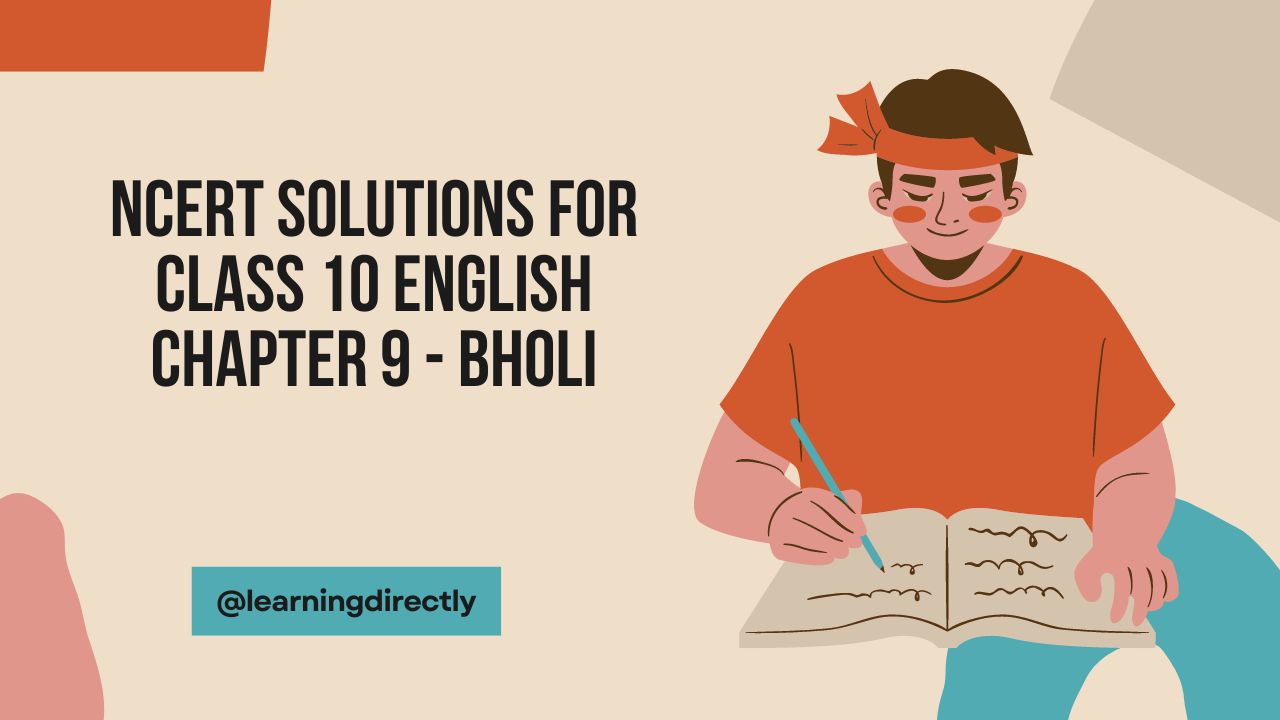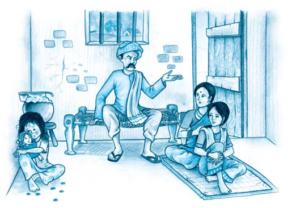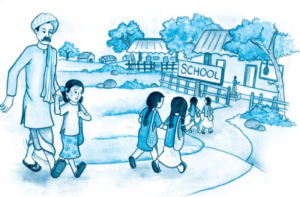The NCERT Solutions for Class 10 English Chapter 9 – “Bholi” provides detailed answers to all the questions in the chapter. Written by K.A. Abbas, “Bholi” is a heartwarming story about a simple, neglected girl named Bholi, who grows up with a speech defect and is initially considered a burden by her family. However, with the help of education and the kindness of her teacher, Bholi gains confidence, learns to assert herself, and eventually rejects an unfair marriage proposal, standing up for her rights.
NCERT Solutions for Class 10 English Chapter 9 – Bholi
Question 1. Why is Bholi’s father worried about her?
Answer: Bholi was different from other children. She neither had good looks nor intelligence. Bholi’s father was worried about finding a good bridegroom for Bholi.
Question 2. For what unusual reasons is Bholi sent to school?
Answer: The Tehsildar had instructed Bholi’s father, Ramlal, to send his girls to school as an example. Ramlal’s wife believed that sending girls to school would have an influence on their marriage prospects. However, she stated that Bholi may be sent to school because she had a low chance of marrying with such an awful look and lack of brains. Thus, Bholi was sent to school.
NCERT Solutions for Class 10 English Chapter 9 – Bholi
Read and Find Out
Question 1. Does Bholi enjoy her first day at school?
Answer: Yes, Bholi liked her first day of school. Initially, she was scared. But she was happy to see so many girls her age present. She suspected that one of the females may become her buddy. She was also drawn to the many photographs on the classroom wall.
Question 2. Does she find her teacher different from the people at home?
Answer: Yes, she finds her instructor to be quite different from the folks at home. At home, she is never addressed too politely, yet her instructor speaks to her in a soothing tone.
She was mocked at home because she stammered, but her instructor taught her to speak confidently instead. This touched her heart.
NCERT Solutions for Class 10 English Chapter 9 – Bholi
Read and Find Out
Question 1. Why do Bholi’s parents accept Bishamber’s marriage proposal?
Answer: Bholi’s parents approved Bishamber’s marriage proposal because they believed she would never receive another marriage proposal and would remain single her entire life. Bishamber was a wealthy grocer who had not requested a dowry.
Question 2. Why does the marriage not take place?
Answer: Bholi’s parents approved Bishamber’s marriage proposal because they believed she would never receive another marriage proposal and would remain single her entire life. Bishamber was a wealthy grocer who had not requested a dowry.
NCERT Solutions for Class 10 English Chapter 9 – Bholi
Think About It
Question 1. Bholi had many apprehensions about going to school. What made her feel that she was going to a better place than her home?
Answer: Bholi was very apprehensive about going to school. She had seen Lakshmi, their old cow, getting sold out.
When Bholi was given clean clothes to wear, was bathed, and her hair was oiled, she felt that she was going to a better place than her home.
Question 2. How did Bholi’s teacher play an important role in changing the course of her life?
Answer: Bholi’s instructor did not make light of her stammering, as others had. She urged her to talk without fear. Unlike the others, she was cordial to Bholi. The teacher had a significant impact on her life, helping her become a competent reader, writer, and speaker.
Question 3. Why did Bholi at first agree to an unequal match? Why did she later reject the marriage? What does this tell us about her?
Answer: Bholi first agreed to an unequal match after hearing her parents discuss the marriage proposal. They were anxious about Bholi’s marriage and believed that this was the finest proposal she could get because the man had not even requested a dowry.
On the wedding day, when the bridegroom noticed Bholi’s pock-marks, he requested a dowry of five thousand rupees. He embarrassed her father over the dowry. That is why she refused the marriage.
This indicates that Bholi has self-esteem and confidence. She did not want her father to provide a dowry for her marriage. She was able to make a courageous and intelligent decision on her own.
Question 4. Bholi’s real name is Sulekha. We are told this right at the beginning. But only in the last but one paragraph of the story is Bholi called Sulekha again. Why do you think she is called Sulekha at that point in the story?
Answer: Bholi stands for a simpleton. She never takes a stand. She does what is told. She even consents to an unequal match for the sake of her parents. However, at the end of the narrative, when she witnesses her father pleading in front of the bridegroom and being humiliated, she refuses to marry. At that point in the novel, she is referred to as Sulekha since she is a grown and intellectual girl capable of making her own judgments. She is aware of her rights and will not tolerate anyone humiliating her family.
Question 5. Bholi’s story must have moved you. Do you think girl children are not treated on par with boys? You are aware that the government has introduced a scheme to save the girl child as the sex ratio is declining. The scheme is called Beti Bachao Beti Padhao, Save the Girl Child.
Read about the scheme and design a poster in groups of four and display it on the school notice board.
Answer: Do it yourself.
NCERT Solutions for Class 10 English Chapter 9 – Bholi
Talk About It
Question 1. Bholi’s teacher helped her overcome social barriers by encouraging and motivating her. How do you think you can contribute towards changing the social attitudes illustrated in this story?
Answer: We can contribute towards changing the social attitudes illustrated in the story by:
- Ensuring that girls and boys are aware of their rights
- Treating girls and boys equally
- Giving them equal rights to education and employment
- Saying ‘No’ to dowry
Question 2. Should girls be aware of their rights, and assert them? Should girls and boys have the same rights, duties, and privileges? What are some of the ways in which society treats them differently? When we speak of ‘human rights’, do we differentiate between girls’ rights and boys’ rights?
Answer: Yes, females should be aware of their rights and exercise them. Girls and boys must have equal rights, obligations, and advantages.
People regard boys and girls differently, particularly in rural and small towns. Parents spend more money on their sons’ schooling than on their daughters’. They teach their girls to be courteous, calm, and adept at home duties.
When we talk about ‘human rights’, the law makes no distinction between girls’ and boys’ rights. However, this discrepancy exists throughout society.
Question 3. Do you think the characters in the story were speaking to each other in English? If not, in which language were they speaking? (You can get clues from the names of the persons and the non-English words used in the story.)
Answer: No, the characters in the story did not speak to each other in English. Words in the text like pita ji, tehsildaar, izzat, number dar, etc. indicate that the characters in the story were speaking in Hindi.
NCERT Solutions for Class 10 English Chapter 9 – Bholi
For the Next Chapter Solution Click Below
CHAPTER 1 – A Triumph of Surgery
CHAPTER 3 – The Midnight Visitor
CHAPTER 4 – A Question of Trust
CHAPTER 5 – Footprints without Feet
CHAPTER 6 – The Making of a Scientist
CHAPTER 10 – The Book That Saved the Earth



